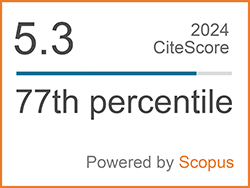Sampling Frequency and Digital Noise Filtering for Transient Kinetic Study in CSTR via Temperature Scanning and Composition Modulation Technique
Abstract
Temperature Scanning and Composition Modulation technique (TS-CM) is a technique for estimating reaction parameters under transient conditions in a CSTR reactor. Studies of reaction kinetics performed under transient conditions can lead to savings of time and resources as compared to the conventional steady-state method. This is because a collection of data necessary for extracting the reaction kinetics can be obtained within a single experiment. This research focused on the refinement of TS-CM technique as an efficient tool for reaction kinetics studies. The alkaline hydrolysis of ethyl acetate was used as a model reaction. Different degrees of noise intensity were added to the output signal of NaOH concentration in order to study the effect of noise (0.5, 1.0, 3.0 and 5.0%) and sampling period (1, 30 and 60 seconds) on the accuracy of reaction kinetics. Results revealed that the sampling period of 1 second yielded only slight errors of kinetic parameters compared to that of without noise.The second part dealt with noise filtering. In order to smooth the NaOH concentration data, TS-CM technique was applied with three digital filters: a) the first-order filter or first-order filter, b) the second-order filter or second-order filter and c) the Savitzky-Golay filter. Results showed that the best filter was the Savitzky-Golay, which filtered with 81 points of window size and 2nd order of polynomial degree.
Keywords
Refbacks
- There are currently no refbacks.
 Applied Science and Engineering Progress
Applied Science and Engineering Progress







